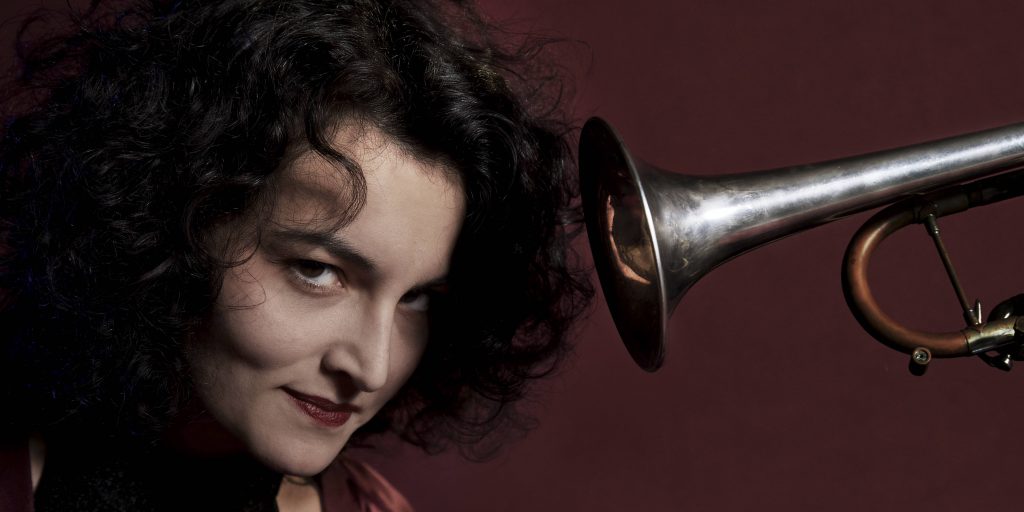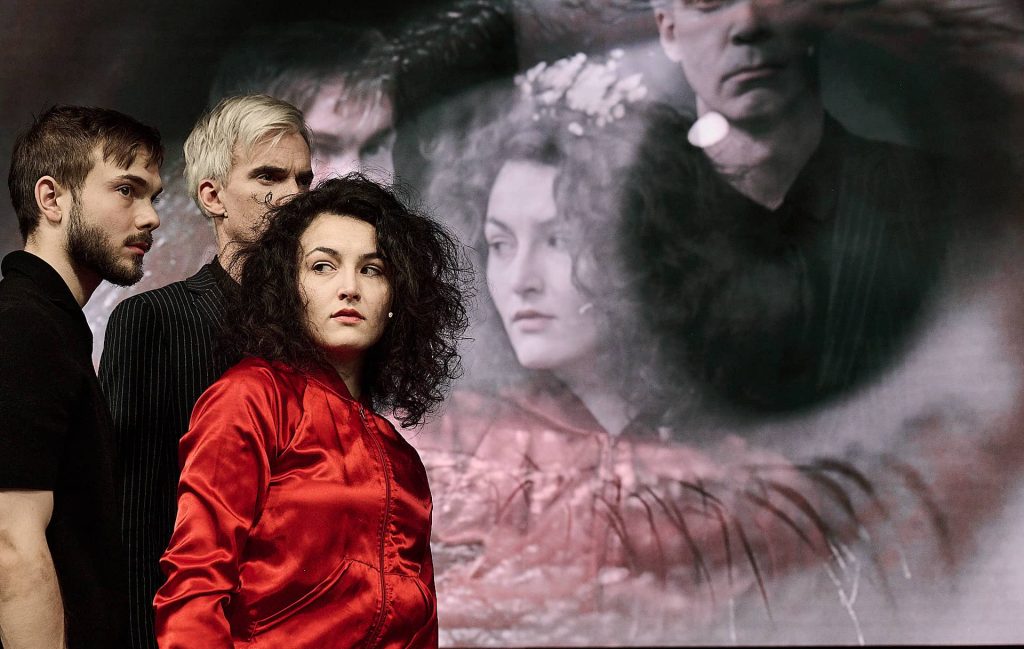
“Part of that force which always wills evil…”
With the revival of “Empathy for the Devil”, NICO AND THE NAVIGATORS explore the origins and function of evil: do we need this counter-image for the good to gain clear contours? The necessity of this construct is put up for debate – not in order to justify it, but to reveal how the good only becomes conceivable in the shadow of its opposite.
Baroque and contemporary compositions, operatic arias and pop songs provide the foundation for an evening that, in many facets, negotiates both the fascination and the disquiet provoked by evil. As a pathos-tinged, ironic salute to the Rolling Stones’ “Sympathy for the Devil”, the piece addresses the role of that force personified in the devil, which, according to Goethe, “always wills evil and always brings forth good.”
Originally conceived as an orchestral version for the 200th anniversary of the Konzerthaus Berlin, the chamber version brings together a wealth of diabolical material from literature and music to create a multifaceted encounter with evil. That this involves not only private contracts with the devil and the temptations of deadly sins, but also political alliances and apocalyptic prophecies goes without saying in view of the current state of the world.

” … The prelude for a rousing evening is given: … The ensemble sings and dances as if in a frenzy and in between reflects on good and evil. As if they were possessed by the devil, singers, dancers and actors outdo each other … Evil seduces … Nico and the Navigators lead the audience through the abyss of the soul and make it clear: the devil is all of us. The premiere audience enjoys this parade of evil and applauds enthusiastically.”
Finally, the "staged concert" of the Berlin theatre collective Nico and the Navigators at the Radialsystem entitled "Empathy for the Devil" is more exciting and gripping. "I'm sorry," actor Martin Clausen yells with a pain-distorted expression, accusingly holding out a sheet of paper to the audience: "Contract" is written on it in large letters. Anyone familiar with Goethe's "Faust" knows: this is the contract with the devil! The prelude for a rousing evening is given: Nico and the Navigators give the Prince of Hell human form and let him appear sometimes as a bon vivant in high heels and glitter stole, sometimes as a melancholic suit wearer or as a sexy vamp in red satin. The ensemble sings and dances as if in a frenzy and in between reflects on good and evil. As if they were possessed by the devil, singers, dancers and actors outdo each other with demonic grimaces. No eye movement and no bead of sweat goes unnoticed, for the faces of the performers are doubled larger than life on a screen. Evil seduces by giving voyeuristic pleasure.
The musical repertoire for this diabolical round dance ranges from Monteverdi to Tchaikovsky to Jeff Buckley. Unconventional arrangements create an effortless transition between the genres: Schumann is accompanied by electric guitar, Handel is subtly jazzed up and the Stones classic "Sympathy for the Devil" leads naturally to Henry Purcell. The singers are also convincing with stylistically confident versatility: above all, the hypnotic voice of tenor Ted Schmitz is just as at home in Benjamin Britten's sound universes as in rock songs by David Bowie. Meanwhile, mezzo-soprano Anna-Doris Capitelli sings about a devil who has grown tired of his role with the lament "Lasciatemi morire". One could feel sorry for the poor guy: after all, he has had to serve as a projection screen for our forbidden desires for millennia. Nico and the Navigators lead the audience through the abyss of the soul and make it clear: the devil is all of us. The premiere audience enjoys this parade of evil and applauds enthusiastically."
“Impressive emotional cinema at Radialsystem Berlin. On Thursday evening, “Empathy for the Devil” by Nico and the Navigators celebrated its premiere in the house that provides space for ambitious productions of the independent scene. Finally. Actually, their new work was supposed to be performed at the Konzerthaus am Gedarmenmarkt – with a large orchestra. But due to corona, nothing came of it. Now there is a chamber version whose power and intimacy keep you in suspense for over 90 minutes.”
Nico and The Navigators impress in Berlin with "Empathy for the Devil".
Berlin/MZ - Impressive emotional cinema at Radialsystem Berlin. On Thursday evening, "Empathy for the Devil" by Nico and the Navigators celebrated its premiere in the house that provides space for ambitious productions of the independent scene. Finally. Actually, their new work was supposed to be performed at the Konzerthaus am Gedarmenmarkt - with a large orchestra. But due to corona, nothing came of it. Now there is a chamber version whose power and intimacy keep you in suspense for over 90 minutes.
Founded in 1998 at the Bauhaus Dessau by Nicola Hümpel and Oliver Proske and still led today, the Navigators have long since gained great recognition. The format is called "Staged Concert", which, however, rather soberly describes the sensual opulence and fascinating variety of what is offered.
Like earlier productions by the Berlin-based troupe, "Empathy for the Devil" is a breathtaking mixture of opera, concert, drama and dance. In short - a unique musical theatre created by Nicola (Nico) Hümpel, the artistic director, Oliver Proske, who is responsible for stage and technology, the dramaturge Andreas Hillger and the whole, fantastic ensemble.
Thematically, the evening revolves around good and evil, life and death. What if the omnipresence of the dark is interpreted as a free pass for one's own actions? Wouldn't good, on the other hand, lack specialness if evil did not exist at all? And, finally, doesn't the Lord of Darkness also possess charm? Don't we ourselves like to wear a rigid "poker face"?
"Sympathy for the Devil" by Mick Jagger and Keith Richards, here in the German version by Udo Lindenberg, tells of this dichotomy of human existence and provides the intellectual background for the Navigators' theatrical ethical debate.
They conduct this debate with the help of their own texts and quote Shakespeare, accompanied by music from Handel to Weber, Bartók to Purcell. It begins with David Bowie's haunting "The Man who sold the World", Ted Schmitz, a tenor who can play all registers, gives his part just as magnificently as Anna-Doris Capitelli gives hers. When the mezzo-soprano delivers seemingly feather-light coloratura, it is easy to understand why she was brought to La Scala in Milan. Much applause at the end for all, especially for Florian Graul's dancing, Nikolay Borchev's voice and Martin Clausen's strong playing.
“A stunning round dance spreads out during the 90 electrifying minutes…. Go and see this play. It makes you devilishly happy!”
Tired, frustrated, dissatisfied? The music show "Empathy for the Devil" by Nico and the Navigators is not only devilishly good, but also makes you happy.
If you are currently feeling the blues because of Corona or other reasons and want to bring a lighter moment into your life, then check out this play! "Empathy for the Devil", put together by the artist collective Nico and the Navigators, does not follow any rule, any norm and, yes, also incidentally breaks all known genre boundaries. But that is precisely where the magic of this music theatre performance lies. A highlight of the musical calendar year.
But what is it about? Last year, the artist collective Nico and the Navigators actually wanted to perform Carl Maria von Weber's "Freischütz" with the Konzerthausorchester, in a fresh, modern and newly adapted version. But that didn't work out because of the pandemic. And so the programme had to be thrown around and rearranged. The artists went back and, appropriately enough, looked at the motif of the devil, evil that is, and chewed on this diabolical initial idea in a long process that lasted almost three months. Next, the appropriate pieces of music were picked out and arranged for the band. Now you can marvel at the result.
On Thursday, the premiere was celebrated at Radialsystem. The end result is a daring par force ride through history, through all the dark feelings and states of consciousness a human being can have. The play is a mix of classical and pop, rock and baroque, as if there were no artistic or aesthetic barriers. From scene to scene, the performers act out different diabolical situations that make you think and ask the question: What exactly is it that is evil? Is it inside us or does it creep into us? As Wagner already knew, it is very easy to find it in the musically dionysian.
On stage left is the band, consisting of violin, piano, guitar, drums and trumpet. So here, too, everything is half pop, half operatic and, above all, surprising. Sometimes the musicians mutate into performers and the performers into perfectly formed opera singers. Sometimes David Bowie is sung ("The Man Who Sold The World"), sometimes the "Aria of the Demon" by Anton Rubinstein, sometimes a Mephisto piece from Charles Gonoud's "Faust" or "Happiness Is a Warm Gun" by the Beatles. Each piece breathes feeling, power, verve. A stunning round dance spreads out within the 90 electrifying minutes, consisting not only of singing and performance, but also of dance. Particularly impressive is the performative madness displayed by actor Martin Clausen. You get scared, also thanks to the cleverly used cameras and video snippets - and yet feel liberated. Go and see this play. It makes you devilishly happy!
“Artfully put together … this artistic power that wants to get out can be felt … the devilish of the singers and performers literally jumps at us … What remains is a feeling of unease. But despite all the sad power that lies in the piece, there is hope.”
The devilish and the pact with evil is at the centre of the latest production by the Berlin music theatre performers of Nico and the Navigators: "Empathy for the devil". A free scenic-musical association that was actually supposed to premiere at the Konzerthaus a year ago for the Konzerthaus anniversary and on the occasion of 200 years of "Freischütz". Tonight, "Empathy for the devil" is now premiering in a chamber version at the Radialsystem. A so-called staged concert that gets to the bottom of the origins and reasons for evil, without which good would be inconceivable. Frauke Thiele watched the rehearsals:
Compassion for the devil, understanding for evil - that's what this musical-performative collage by Nicola Hümpel and her artistic team from Nico and the Navigators is about, no more and no less:
"Where does social evil exist at the moment (...) it's not this idea that the beast is raging inside us and that everyone is basically bad, but, (...) that actually evil lies in society, in looking away, in collective misbehaviour, so to speak."
Understanding the devil also means, of course, understanding what makes us become evil: Money, politics, power, seductiveness - so quickly good becomes evil and vice versa. And in the same way, scenes, characters, music change, from David Bowie to Purcel, from John Lennon to Rubinstein - played by surprisingly few musicians: violin, trumpet, electric guitar, percussion, piano - the mix is fast, interesting and the mixture of styles is no problem!
"...we basically went into the research collectively and chose pieces of which we had the impression that we could tell something with them. That's basically always the case with us (...) we look at a lot of things and then certain things stay in the production and others get thrown out again."
The devil appears at the beginning in the form of the pianist, who speaks and laughs into the camera at the front of the stage, then the actor takes on the role of the devil, but evil also appears again and again in the female singer, the two male singers, the dancer. Understanding evil, however, does not automatically mean compassion or sympathy for the devil, as in the Rolling Stones - even if the song is recited in German...
Thoughts emerge, are carried on, dissolved in images, the music, the singing, the dancing, the spoken and performed lyrics. Sometimes mental references are clear, sometimes you sense them more in moments that hit like a blast.
"You have to say that as artists, of course we all have two years of suffering behind us and - something wants to come out. We also slowly feel the demon inside us and a force that always wants the bad and always creates the good (laughs). So we are all so close to bursting and now we have to express that and this evening is wonderfully suited for that and we hope that we also touch a soul core of the audience with it."
This artistic power that wants to get out - it can be felt in every way. The devilishness in the looks of the singers and performers literally jumps out at us. Captured by three cameras on stage and then mixed live and artfully on film - on the large video screen at the back of the stage.
By the way, only two very elementary scenes from Freischütz remain: the pact with the devil and the scene with the missed bullet, and these are very modified. But that doesn't matter.
Otherwise, everything is quite freely conceived and improvised, artfully put together. What remains: a feeling of unease, also a sadness that things are the way they are, in us and in the world. - But a statement that also sticks: (the human being is good in itself, it's just not that simple...).
"That we are by all means more cooperative beings than we think and that lies in the origin of man and we have lost to believe in it because we are too fascinated by this evil and that is something that is perpetuated again and again in history..."
This basic idea of the piece "Empathy for the devil" runs through music, images, play. And, by the way, it is borrowed from Rutger Bregman's book: Humankind - A Hopeful History. It is also quoted again and again in the play. So despite everything that weighs so heavily right now, despite all the sad power that is in the play, there is definitely hope…
“The question of the origin and mode of action of evil is the core of “Empathy for the Devil”. There is something enormously seductive about the concept of the demonic…The various aspects are reflected in texts of the evening…The musical round dance builds a bridge from early baroque to contemporary pop: Henry Purcell meets David Bowie, Carl Maria von Weber meets the Rolling Stones.”
Before the devil threw a spanner in the works, the exploration of a classic of German music theatre had already begun. "The Konzerthaus invited us to develop a free production on the pact with the devil for its 200th anniversary," recalls Nicola Hümpel, director and artistic director of the ensemble Nico and the Navigators. The house had opened in the summer of 1821 with the premiere of "Freischütz" by Carl Maria von Weber. "With various works on the devil theme, we conceived an evening for large orchestra with conductor Jonathan Stockhammer - a fantastic collaboration." The idea was to incorporate fragments of "Weber's Freischütz" in a newly adapted version.
However, due to Corona, everything turned out differently: the performance was still to take place with the Konzerthausorchester, but no longer in front of an audience. The evening would have been broadcast on the internet. "We now had to stage it completely on film," says Hümpel. But even this preparatory work was for naught. "In the end, the orchestra was also dropped, we conceived a chamber version for which we had to restage everything. That way, the drama got a stronger share."
What remained of the "Freischütz" was the Wolfsschlucht scene. In it, the protagonist casts the so-called free bullets. Six pieces of this magic ammunition hit their target in every case. But with the seventh, the devil takes a human victim. "This reflects our current behaviour, for example with regard to climate change," explains Hümpel. "We ignore our responsibility, but at some point it catches up with us. At some point, that seventh bullet hits." The question of the origin and mode of action of evil is at the core of "Empathy for the Devil". There is something enormously seductive about the concept of the demonic. "Because it distracts from the fact that we humans, in our passivity or silent consent, are always co-responsible, which we would prefer to simply delegate away." Conversely, this means that although humans like to block out negative consequences of their actions, they rarely really feel like consciously causing harm to others in the process. Meat consumption is an example. Thus, the misery of animals is suppressed until one consciously perceives the cruelties that happen in slaughterhouses - which not infrequently leads to a change in eating habits. "One has found numerous rifles in the trenches of earlier wars that were loaded several times but never fired. The inhibition threshold to kill someone face to face is also not eroded per se by war," Hümpel emphasises. "Humans behave cooperatively, that has proven to be an evolutionary advantage." Of course there is a fascination with evil - but its glorification in literature, film or music has little to do with reality, he says. "Even with mass killers or serial killers, there is a back story. It has been shown that often perceived suffering and traumas suffered are compensated for with the perpetration of violence."
The various aspects are reflected in the evening's texts, which include, for example, a Shakespeare sonnet, excerpts from Rutger Bregman's "Basically Good: A New History of Humanity" as well as passages written for the evening by Nicola Hümpel in dialogue with Navigators. The musical round dance builds a bridge from early baroque to contemporary pop: Henry Purcell meets David Bowie, Carl Maria von Weber meets the Rolling Stones. In their emblematic song "Sympathy For The Devil", the devilish has a clear human connotation - and always has political implications. So it says: "I shouted out / Who killed the Kennedys? / When after all / It was you and me."
People thus have it in their hands to shape not only their society but also their future. But this requires a view that includes togetherness. "Democracy includes freedom, but also responsibility. The belief that we can always do what we want leads us down the wrong path. We were in a position to cause pandemics. So we also have a responsibility to make our society fit for the future again." Hümpel has no sympathy for opponents of vaccination and people who cannot observe the simplest rules of hygiene. "They are destroying the culture, they are risking lives and they are not showing solidarity."
“In terms of content, Hümpel wants to grasp evil in a new way. It seems outdated to me to think about whether man is basically a beast. The diabolical usually lies – see climate change, see Corona – in collective looking the other way and opportunism rather than in the evil actions of an individual,’ she says. With such a motivic, Empathy for the Devil is very contemporary musical theatre … The fact that the conductor Jonathan Stockhammer, who is not needed in the chamber version, now straps on his electric bass in order to be able to continue to take part, can be seen as proof of the joy of the rehearsal work.”
Radialsystem. Nico & the Navigators perform a chamber version of "Empathy for the Devil".
"Sympathy for the Devil" was once courted by the Rolling Stones. Mick Jagger portrayed the devil as a melancholic figure who, despite all his evil deeds, places great value on style. Jagger's devil also appears transformed on Nico and the Navigators. "Of course 'Sympathy for the Devil' appears, but in Udo Lindenberg's version," reveals director Nicola Hümpel. "Pleased to meet you, guess who I am? What irritates you is my acting without sense," is the refrain of the Lindenberg version. Performer Martin Clausen, one of the original navigators, covers the alt-rocker in a spoken-song variant.
The origin of Hümpel & Co.'s devil's play, however, was the devil's pact of "Freischütz" by Carl Maria von Weber. "For the 200th birthday of the Konzerthaus Berlin and the 200th birthday of the premiere of 'Freischütz' in this building, 'Empathy for the Devil' was supposed to come out. But then Corona threw a spanner in the works. We redesigned the large version for orchestra several times. Now we have a chamber version for the Radialsystem," Hümpel explains. Elements of "Freischütz" are still included. Of course, it's about the seventh bullet, the one that is remotely guided by evil and always hits the target that the devil has chosen and not the one the shooter is aiming at. There are also other opera excerpts, the "Demon Aria" by Anton Rubinstein, for example, and compositions by Claudio Monteverdi and Benjamin Britten. The musical arc extends to today's pop modernity, for example with Radiohead and Jeff Buckley.
In terms of content, Hümpel wants to recast evil. "It seems outdated to me to think about whether man is basically a beast. The diabolical usually lies - see climate change, see Corona - in collective looking away and opportunism rather than in the evil actions of an individual," she says. With such a motif, "Empathy for the Devil" is very contemporary music theatre. Hümpel has been able to win over three outstanding singers: Anna-Doris Capitelli, a mezzo-soprano who belongs to the ensemble of La Scala in Milan, Ted Schmitz, a tenor who performs extensively in the USA and Great Britain, and Nikolay Borchev, a baritone who has sung at the great houses in New York and Paris, Madrid, Munich and Berlin. The orchestra has been reduced to chamber ensemble size with six musicians. The fact that the conductor Jonathan Stockhammer, who is not needed in the chamber version, now straps on his electric bass in order to be able to continue playing, can be seen as proof of the joy of rehearsal work.
Oliver Proske, stage designer of the Navigators productions for almost 25 years and known for overwhelming constructions, holds back on analogue stage construction in this production. Instead, he has put a lot of time and programming work into the video system. This is very unusual for the performing arts in this form. "We work with several self-moving cameras that move into position. They are controlled by software. It works like a light console," Proske explains.
For the performers, this means moving even more precisely to agreed positions. Hümpel sees the artistic added value in the fact that the faces become moving landscapes. "There are so many possibilities for detail. The players also feel this in their feedback. You can play a whole audience with a movement of the eyebrows," Hümpel enthuses. So sometimes evil can be expressed in the twitching of an eyebrow - you can check it out from 16 December at Radialsystem.



Tickets for this date are not available yet. Leave your mail adress to get notified when tickets are available.